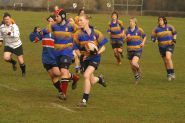PE teachers make naturally strong candidates for senior leadership roles in schools.
While that may sound like a controversial statement, it makes sense to me that this should be the case. And why not?
A Twitter poll of 859 Secondary Teachers found that 67% of schools had PE teachers within their Senior Leadership Team. Of this sample, 36% of schools had just the one PE teacher represented while a further 31% taught at schools with more than one PE teacher represented. Does this support the statement? Or is it just a coincidence?
The nature of teaching a subject like PE requires key skills I feel are necessary to be an effective leader, such as:
- the ability to be well organised and to communicate clearly and effectively with an audience
- excellent behaviour management strategies
- being adaptable according to the weather or change of last minute change of workspace
- confidence and a good motivation skills
- resilience
- working effectively as part of a team
- dealing effectively with challenging situations
Most of these skills are likely to have been developed through continued involvement or participation in sports activities, offering PE staff the very basics for being strong candidates for leadership roles in schools.
Transferable leadership skills
This is an opinion shared by Mr Karl Mackey, Principal at The Albion Academy in Salford, who discussed with me his belief that such leadership skills are transferable from a sporting environment into teaching, allowing PE teachers to flourish with school senior leadership responsibilities in many cases.
A further Twitter poll of 17 Headteachers found that 59% agreed with this statement, while a further 29% felt it was somewhat true, adding additional weight in support of my original statement.
Upon receiving this information, I spoke to Sir Iain Hall, Co-Founder of Future Leaders and CEO for the Great Schools Trust, who initially seemed to support my theory. Sir Iain informed me that he had “met many school leaders from a PE background that were all good team members, had drive and energy to compete and a determination to succeed”.
However, Sir Iain then went on to say he does not necessarily think that they are attributes only of PE teachers, and that as a former Maths and Physics teacher, he too shared these characteristics.
Fitting the core values of an organisation are a more important factor for him when selecting future leaders than individual teaching backgrounds or skills and qualities. This makes sense.
All the skills and qualities of a PE teacher listed earlier may also apply to any other subject teachers in school, so do not necessarily mean that staff in possession of these skills could frequently demonstrate the ability to promote positive character and resilience through the power of leadership, as are the values associated with the Great Schools Trust.
Flexibility is the key
Research (Jacobsen et al. 2005) suggests the most successful school leaders are those who remain open and flexible and are ready to learn from others. These leaders are persistent and ensure their responses are grounded in a set of core principles and values. It is clear that a focus on organisational values should be at the centre of our approach to lead effectively in schools.
Karl Mackey believes that is not simply organisational values that should be embraced by PE teachers, and other staff alike, but the understanding of the additional qualities and responsibilities that come with a senior leadership role, such as the values of putting people first and always doing what you say you are going to do, despite the volume of additional workload and administration tasks that come with the responsibilities of being a senior leader.
A report from the Harvard Business Review (2016) which stated that Academy leaders from PE subject backgrounds may not actually be the most effective in the long-term for school success due to their ‘surgeon’ type Headteacher styles.
They were deemed in general to offer least effective Headteacher style as they focus too much on the winners and losers rather than longer term sustainability. So, while they were observed to achieve short-term success in failing schools, it is actually the ‘architects’ (History, Economic, Music and Physics teachers) that are the highest achieving Headteachers and a more effective choice for Academy leadership according to the study.
This makes difficult reading and should serve as a reminder for all of us from PE backgrounds progressing into senior leadership roles that we must be mindful of the long term impact of our leadership approach on the students and school in our care, not simply focus on the big win overall.
Whilst there is clear scope for further reading and investigation to support my original statement, it is clear that statement could be true for any teacher regardless of their subject background. Yet I firmly believe that the nature of the role of the PE teacher offers us a unique opportunity to develop the key skills and attributes required to be firm candidates for roles on senior leadership teams if harnessed effectively.
We must ensure we use the opportunities available to consistently demonstrate the values of our organisations and not lose sight of the bigger picture in order to make personal career progression, achieving our success by maximising the positive outcomes on all students in our care along the way.
Special thanks:
With thanks to Sir Iain Hall (@Iainrhall) and Mr Karl Mackey (@karlmackey) for their contributions in this post.
Suggested further reading:
https://educationdatalab.org.uk/2017/01/no-need-to-recruit-headteachers-with-particular-subject-backgrounds/
Rob has been a PE teacher for almost 10 years and has recently been appointed to the school leadership team at Flixton Girls School in Trafford as the Director of Culture & Ethos.










